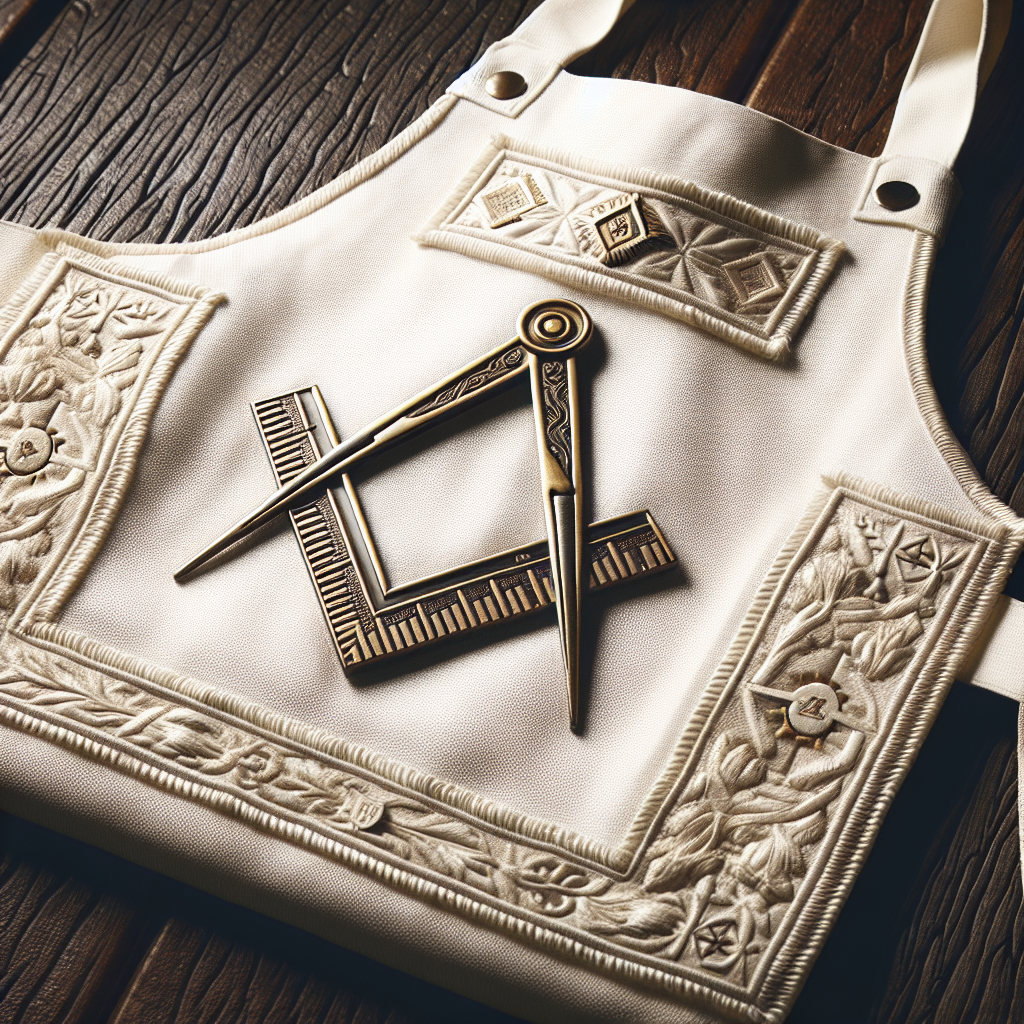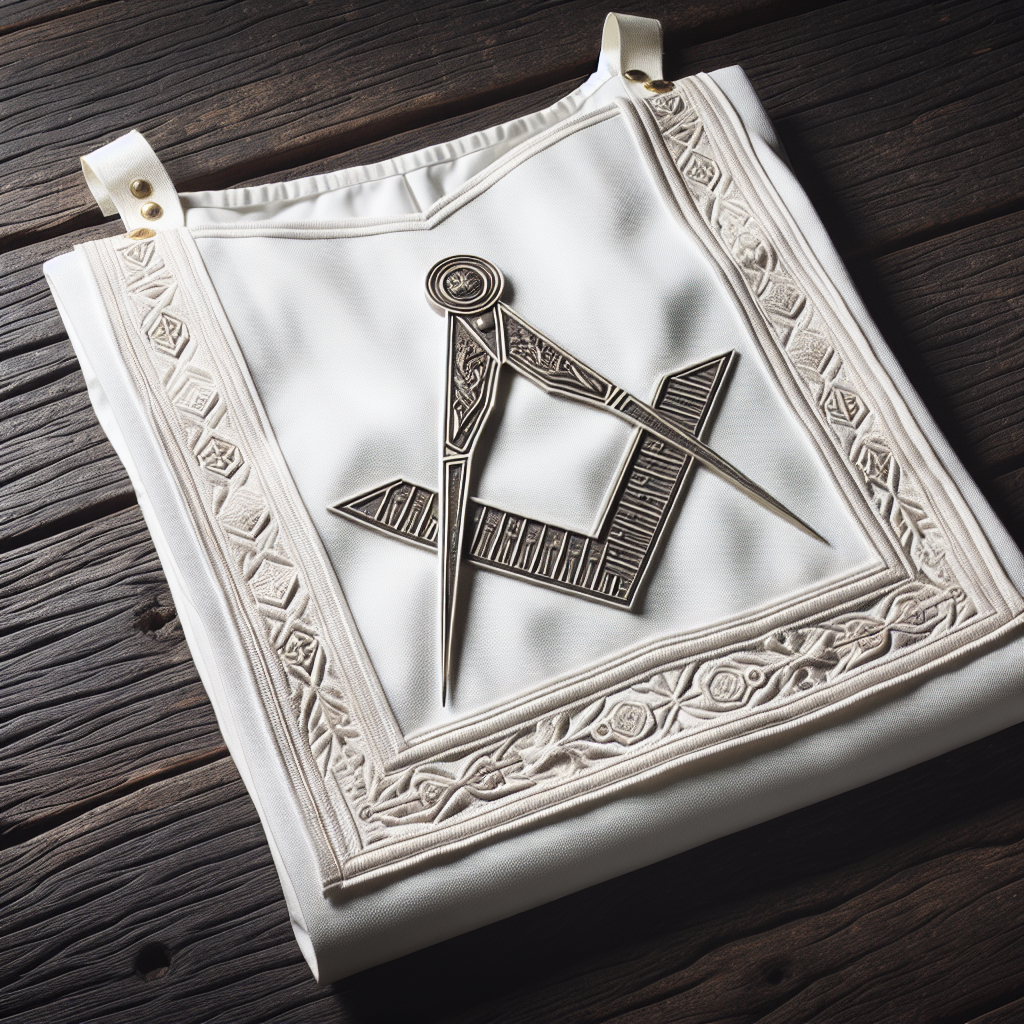
In your journey to understand the plethora of symbols associated with Freemasonry, you’ll undoubtedly encounter one striking emblem – The Masonic Apron. This seemingly ordinary accessory holds a world of significance, offering a unique glimpse into the rich history and philosophical foundations that shape Masonry. Uncover the profound meanings concealed in its design, its color, its adornments — each aspect meticulously chosen for its symbolic value and relevance. In understanding the Masonic Apron, you unravel a significant thread in the complex tapestry of Masonic lore and tradition.
Historical Overview Of The Masonic Apron
The Masonic apron holds a critical place in the long and rich history of Freemasonry. Deeply tied to tradition, symbolism, and rituals, understanding its origins and evolution offers a unique insight into the fraternity’s past and present.
Origins Of The Masonic Apron
The apron has biblical roots, representing innocence and purity. Its use was adopted by stonemasons during the Middle Ages for practical purposes, providing protection while they worked. Freemasonry, which has historical ties to these stonemasons’ guilds, carried on this tradition, adopting the apron as a potent symbol of their fraternity.
Early Use And Purpose
In the early days of Freemasonry, the apron was a simple, undecorated piece of white lambskin. It functioned as a practical garment for operative masons to protect their clothing. But for speculative masons, those who apply the tools and principles of masonry to moral and philosophical lessons, the apron took on a more symbolic role representing moral purity.
Evolution Of Design Over Time
Over the centuries, the design of the Masonic apron has evolved, mirroring changes within Freemasonry and historical and cultural contexts. From being an undecorated piece of lambskin, it transformed to include intricate symbols, colors, and details. Each addition carries its own significance, and different combinations can represent various Masonic orders and degrees.
Symbolic Meaning Of The Masonic Apron
The Masonic apron is more than mere protective gear; it is a canvas rich with symbols, each carrying deep and varied interpretations according to Masonic teachings.
Significance Of The Color White
The white color of the Masonic apron symbolizes purity and innocence. It signifies a Freemason’s pure intentions and the commitment to leading a life of virtue and integrity.
Meaning of The Square And Compasses
The square and compasses are among the most recognized Masonic symbols. The square symbolizes morality, reminding Masons to square their actions and behave ethically. The compass denotes the boundaries within which Masons must restrict their passions and desires.
Symbolism Of the Three Lights
The three lights found on some aprons represent the Sun, Moon, and Master of the Lodge, symbolizing light, knowledge, and authority. They remind Masons of the fraternity’s continuous illumination and guidance in their quest for wisdom and enlightenment.

Rites Of Passage And The Masonic Apron
Freemasonry is a journey through stages of personal development, symbolized by the degrees of the fraternity. The Masonic apron is a crucial element in these rites of passage.
Initiation Ceremony And The Apron
During initiation into Freemasonry, the new member is presented with a plain, white apron. It symbolizes a blank slate, marking the start of a journey into Masonic knowledge and understanding.
Progression Through The Degrees Of Freemasonry
As a Mason advances through the degrees, the apron changes to reflect this progression. They are adorned with different symbols and elements, each detailing the teachings and lessons learned at each degree, serving as a tangible representation of their Masonic journey.
Final Rite: The Masonic Funeral
In the last rite of passage, a Freemason is laid to rest with his Masonic apron. It signifies his life-long commitment to the fraternity and its principles, showing his enduring bond with the brotherhood, even in death.
The Masonic Apron In Different Freemason Orders
Freemasonry is a global fraternity, with several different orders and rites. Each of these has variations in apron design.
Variances In Apron Design Between Orders
Each Freemason order has unique aspects represented in their aprons. They might differ in color, size, shape, or degree of decoration, showcasing the diversity within the fraternity.
Symbolism In Different Orders’ Aprons
Different orders use distinct sets of symbols on their aprons, each bearing meaning specific to their traditions, rituals, and teachings. It gives added depth to the understanding of that particular order’s history and beliefs.
Shared Themes Across All Orders’ Aprons
Despite the differences between orders, there are shared themes in their aprons. Explicitly, the color white, the lambskin, and the square and compasses are common features across all Masonic orders, symbolizing universal Freemason ideals of purity, truth, and ethical living.

The Masonic Apron In Freemasonry Today
The Masonic Apron remains an essential artifact in present-day Freemasonry, holding both traditional and contemporary significance.
Relevance Of the Apron In Modern Freemasonry
In the rituals and ceremonies of domestic lodges, the apron is still highly revered and used, maintaining a tangible link to the past. It connects modern Freemasons with centuries-old tradition, providing a sense of continuity and shared experience.
Contemporary Interpretations Of the Apron’s Symbolism
While the symbolism of the apron is ancient, its meanings remain relevant today. Its teachings of morality, virtue, and wisdom have a timeless appeal, offering guidance for living a good and meaningful life in the modern world.
Current Masonic Apron Manufacturing And Ritual Use
In spite of advances in technology and changes in fashion trends, the Masonic Apron is still crafted with care and attention to detail. Modern aprons continue to be made from lambskin and embellished with the traditional symbols, preserving the authenticity and symbolism of this sacred item.
Wearing Of The Masonic Apron
The Masonic apron is not just for show; its wearing is steeped in tradition and etiquette.
Proper Ways To Wear The Apron
There are specific ways to wear the apron. For Entered Apprentices, it is worn with the flap up, while the Fellowcraft wears it with the flap down but the corners turned up. The Master Mason wears it with the flap down. This progression symbolizes the growth and maturity of a Mason’s understanding and mastery over his passions.
Circumstances Under Which Apron Is Worn
The apron is worn during all Masonic meetings, ceremonies, and rituals. It is a visible sign of membership and recognition amongst Freemasons. Moreover, it serves as a constant reminder of their obligations and commitments to the fraternity and its principles.
Transitions In Wearing Style Through Masonic Degrees
As a Mason progresses through the degrees, the way the apron is worn undergoes certain transitions, each signifying the spiritual and moral development at each stage. Its regular use and presentation create a psychological imprint of the symbolic Masonic journey.

Preservation And Respect For The Masonic Apron
Considering the symbolic and historical value of the Masonic apron, it’s not surprising that it is cared for with the utmost respect.
Storage And Care For The Apron
The Masonic apron should be stored with care. It is often kept in a specially designed leather case to protect it from damage, ensuring it remains clean and white – a sign of its pristine moral symbolism.
Significance Of Apron Presentation Box
Many Masons keep their aprons in presentation boxes as a way of preserving and honoring this critical emblem of their fraternity. These boxes are often passed down through generations, adding another layer of meaning and connection to the Masonic tradition.
Cultural Practices And Traditions Around Apron Care
Different cultural practices exist around apron care, reflecting local customs and traditions within the fraternity. However, the overriding principle is always one of respect and reverence for this essential symbol of the craft.
Artistry And Craftsmanship Of The Masonic Apron
The Masonic apron is not merely a piece of clothing, but a canvas for art and craftsmanship that displays the rich iconography of Freemasonry.
Crafting Materials Used In Aprons
In keeping with tradition, the primary material of the Masonic apron is lambskin, symbolizing purity and innocence. Depending on the rank and jurisdiction, additional materials like silk, velvet, or gold braid might be added, each carrying their symbolic meanings.
Significance Of Apron Decorations
The various symbols and decorations on the Masonic apron are not just for aesthetics. They are loaded with significance, reflecting the teachings and philosophies of Freemasonry.
History And Evolution Of Apron Craftsmanship
The artistry involved in crafting a Masonic apron has evolved with time, with changes reflecting shifts in aesthetic norms, technology, and Masonic understandings. Regardless of the changes, the focus remains on preserving the symbolism and meaning of the apron.

Masonic Apron And Its Influence In Society
As a visible symbol of Freemasonry, the Masonic apron plays roles in shaping the fraternity’s public perception and how it’s portrayed in popular culture.
Apron’s Role In Freemasonry’s Public Image
The apron, with its distinctive design, is often the most recognizable symbol of Freemasonry to the outside world. As such, it plays a crucial role in shaping the public image of the fraternity.
Portrayal Of The Apron In Media And Pop Culture
In films, TV, books, and other media, the Masonic apron often appears as a symbol of mystery and intrigue associated with Freemasonry. While it can create misconceptions, it also serves to inspire curiosity and spark conversations about the fraternity and its beliefs.
Understanding Of the Apron Among Non-Freemasons
The Masonic Apron is often misunderstood or overlooked by non-Masons. However, its rich symbolism and history offer a fascinating insight into the fraternity’s beliefs and values.
Controversies And Misunderstandings About The Masonic Apron
Despite its important role in Freemasonry, the Masonic apron is not free of controversies and misunderstandings.
Common Misconceptions About The Apron
There are many misconceptions about the Masonic apron, mainly fueled by the secrecy surrounding the fraternity. Some mistakenly view it as a sign of elitism or power, while others underestimate its significance, seeing it as mere costume jewelry.
Controversial Interpretations Of Apron Symbols
As intended to stimulate thought and personal interpretation, the symbols on the Masonic apron often lead to diverse, sometimes controversial readings. Freemasonry encourages this exploration but also emphasizes that it should be done with respect for the fraternity’s time-honored teachings and values.
Freemasonry’s Response To Apron Related Criticisms
In response to criticisms and misconceptions about the Masonic apron, the fraternity generally promotes open dialogue and education. By sharing knowledge about its history, symbolism, and proper usage, Freemasonry aims to foster understanding and respect for this important symbol.













